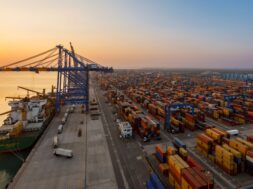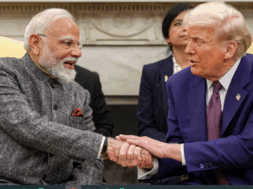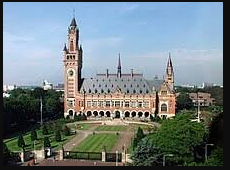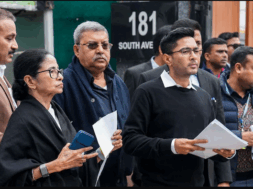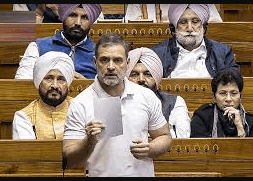
Roving Periscope: After his ‘big win,’ Putin and Xi heap praise on each other!
Virendra Pandit
New Delhi: His victory was never in doubt. For the record, however, Vladimir Putin has just “won” the election as Russia’s President for the fifth term in a row, with an impressive vote margin of 87.33 percent. But he still fell short of many a dictator’s ‘victory margins.’
For example, Iraq’s last dictator Saddam Hussein’s victory margin was an extraordinary 98 percent!
It was a record victory for Putin in a presidential election where he faced no genuine competition—all three rivals ended up with a total of 13 percent of votes cast. Several Western nations routinely described the polls as neither free nor fair, even as they continued to do oil business with Russia.
Putin’s best friend, China’s President Xi Jinping isn’t simply interested in all this ‘democratic nonsense.’ Contesting no election at all, he just gets his hand-picked Communist Party toadies rubber stamp his continuation in office. The last time he did it was in 2023, putting him on the way to being the president for life.
But Xi Jinping, with whose nod Putin started the Ukraine invasion in February 2022, generously congratulated his Russian counterpart, addressing him as “Dear Friend.”
In a message to Putin on Monday, he informed Putin that his re-election “fully reflects the support of the Russian people”, Beijing’s state-controlled media reported.
With 99 percent of polling stations having submitted results, Putin had secured 87.33 percent of all votes cast, official election data showed Monday, according to state news agency RIA.
“In recent years, the Russian people have united as one to overcome challenges and move forward steadily on the road to national development and revitalization,” Xi reportedly said.
“I believe that under your leadership, Russia will be able to achieve greater achievements in national development and construction,” he said.
“China attaches great importance to the development of China-Russia relations and is willing to maintain close communication with Russia to promote the sustained, healthy, stable, and in-depth development of (bilateral ties),” Xi said.
Putin also reciprocated likewise. He heaped praise on key ally Beijing on Monday, saying he was “sure that in the coming years, we will only strengthen and build up our relations and achieve common successes for the benefit of the Chinese and Russian peoples,” Russian state news agency TASS reported.
“The most important thing is the coincidence of state interests. This creates a very good tone for solving common problems in the field of international relations,” Putin was reported as saying.
“The structure of China’s economy is changing towards innovation…We face the same tasks in Russia.”
Once socialist allies, China and Russia endured a tempestuous relationship during the later decades of the 20th century but have drawn closer of late as their burgeoning friendship has come to represent a bulwark against the US-led West.
Their close ties deepened even as Russia’s brutal invasion of Ukraine has roiled Moscow’s relations with Western nations, and China has pointedly refused to condemn its ally’s attack on its European neighbor.
Western countries argued that China’s equivocation has given Putin much-needed political and diplomatic cover to wage an unprovoked war of aggression on Kyiv.
Both leaders have previously hailed the strength of their friendship, having both reshaped their respective countries in their images during protracted tenures at the helm.
Xi last October welcomed his “dear friend” Putin to Beijing, where the Russian President was the guest of honour at a multilateral summit.
The Chinese leader said that “political mutual trust between the two countries is continuously deepening, and hailed their “close and effective strategic coordination.”
Xi noted that he had met with Putin 42 times in the past decade, saying they had “developed a good working relationship and a deep friendship.”
Putin’s journey from being a KGB agent posted in Germany at the time of the Fall of the Berlin Wall in 1989 to helm Russia until now has been extraordinary. There is something about the man, much vilified by the West, that keeps him in power.
For example, soon after his re-election on Monday, Putin described the death of the imprisoned key opposition leader Alexei Navalny as an “unfortunate incident” and claimed he had been ready to release him in exchange for Russian prisoners held in the West, the media reported on Monday.
Addressing a news conference, he said “some people” had told him before Navalny’s death “that there was an idea to exchange Mr. Navalny for some people held in correctional facilities in Western countries.”
“I said, ‘I agree.” “Just with one condition: ‘We’ll trade him but make sure that he doesn’t come back, let him stay over there.’
He added: “But this happens. That’s life.”
The comments, in response to a question from NBC News, were Putin’s first about Navalny’s death at a penal colony in the Arctic— and a rare moment, if not the first, when the Russian President uttered Navalny’s name in public.
Navalny’s supporters also admitted after his death that he was on the verge of being freed in a prisoner exchange. “Early discussions” on the possibility of such a swap had been underway when Russian authorities reported Navalny dead on February 16.
The discussions involved swapping Navalny along with two Americans imprisoned in Russia — Evan Gershkovich, a reporter for The Wall Street Journal, and Paul Whelan, a corporate security executive and former Marine — in exchange for Vadim Krasikov. Currently imprisoned in Germany, Krasikov was convicted of killing a former Chechen separatist fighter in Berlin in 2019.
“This is a sad event,” Putin said about Navalny’s death. “But we’ve had other cases when people have passed away in correctional facilities. And what, hasn’t this happened in the United States, too?”
While Navalny was alive, Putin’s distaste for him was such that he never uttered his name in public. Navalny nearly died in 2020 after being poisoned by a military-grade nerve agent while on a trip to Siberia, viewed as an assassination attempt by the Russian state.


